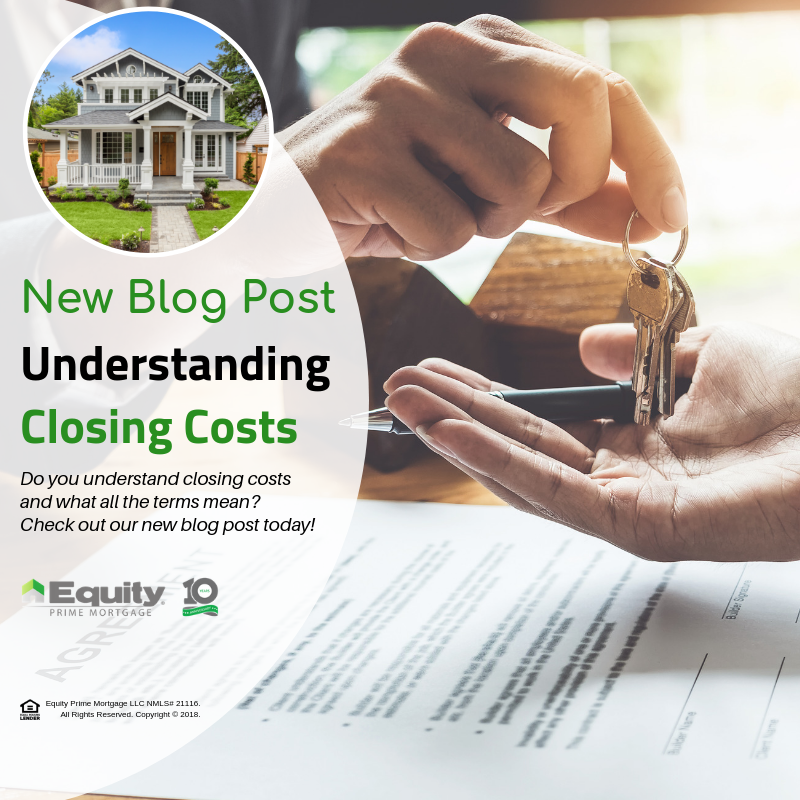Understanding Closing Costs

Posted by Eric Skates on
Closing costs come as a surprise to first time buyers who haven't done their own due diligence. It's basically the costs to procure the loan--the appraisal, inspections, lender fees, recording fees, and more. The bottom line for the mortgage is typically 2-5% of the loan amount, and here is how it breaks down. You will pay some of it during the contract-to-close process, but any loan expenses are accounted for on the Closing Statement.
When you complete the loan application, either in person or online, within three days you'll get a Good Faith Estimate from the lender that outlines every single penny you are likely to spend in buying the house. This includes the earnest money deposit, due diligence fee if you're in a due diligence state (ask your realtor), closing costs you pay up front, and closing costs you pay at closing.
-
Commitment Fee- mortgage companies are for-profit businesses and do expect to be paid. The lenders, or commitment, fee can be a flat fee or a percentage of the loan amount.
-
Interim Interest- interest on mortgage loans is paid in arrears, so when you make your first payment, you'll pay the interest on the prior month. When you close, you pay interest until the end of that month--the per diem is calculated on the interest rate and the days left in the month.
-
Discount Points- if you opt to get a lower interest rate by paying discount points, that money is due at closing.
-
Appraisal Fee- if you're financing, the lender requires an appraisal to ensure their collateral (your house) is indeed worth what you're paying. Plan to pay $400 or more for the appraisal, and the lender may collect that at application.
-
Survey- if you decide to get a survey, you'll pay that either up front or at closing.
-
Inspections- you'll want to make sure the house is in good working order, so you'll have structural and mechanical inspections, and may go further with electrical, roof, mold, pest, and radon. Plan to spend several hundred dollars up front for this work.
-
Taxes and Insurance- you'll pay several months property taxes and homeowners insurance at closing, to be held in reserve. The balance will be divided and rolled into your mortgage each month if your lender is holding the funds in escrow and is paying your taxes and insurance. Most lenders require this, as it guarantees these will be paid.
-
Title Search and Title Insurance- the seller is obligated to deliver a clear title to you, the buyer--but how do you know they can deliver? You have an attorney research the title to the property, to ensure there are no unknown liens or encumbrances that would prevent you from taking clear ownership to the house. Once you have evidence of clear title, you purchase title insurance, that protects you in the event of a dispute over title. Should that happen, the title insurance pays your mortgage off so you aren't obligated to pay for a house you don't actually own.
-
Doc Prep, Recording, Courier, Flood Certification, Escrow Agent or Attorney Fees- these are paid to the lender, the county, and the attorney or escrow agent closing the loan. If you bought a house before 2010, these were the "junk" or miscellaneous fees. One of the benefits of the new Closing Document (formerly the HUD1) is that those fees are explained in detail for the borrower.
-
Realtor Commissions- as the buyer you're not usually responsible for paying realtor commissions, but the amount will be on the seller's side of the closing document.
When you review this list and your loan documents, you'll see that all of these expenses are transparent and accountable. Your loan officer and your realtor should provide you another disclosure form that confirms all the vendors associated with your mortgage loan do not pay any referral fees to them.
Equity Prime Mortgage is dedicated to providing you with a clear and professional experience, whether you're buying your first home or your fifth. Ready to get started? Contact us today at (877) 255-3554 or log on to epm.net



